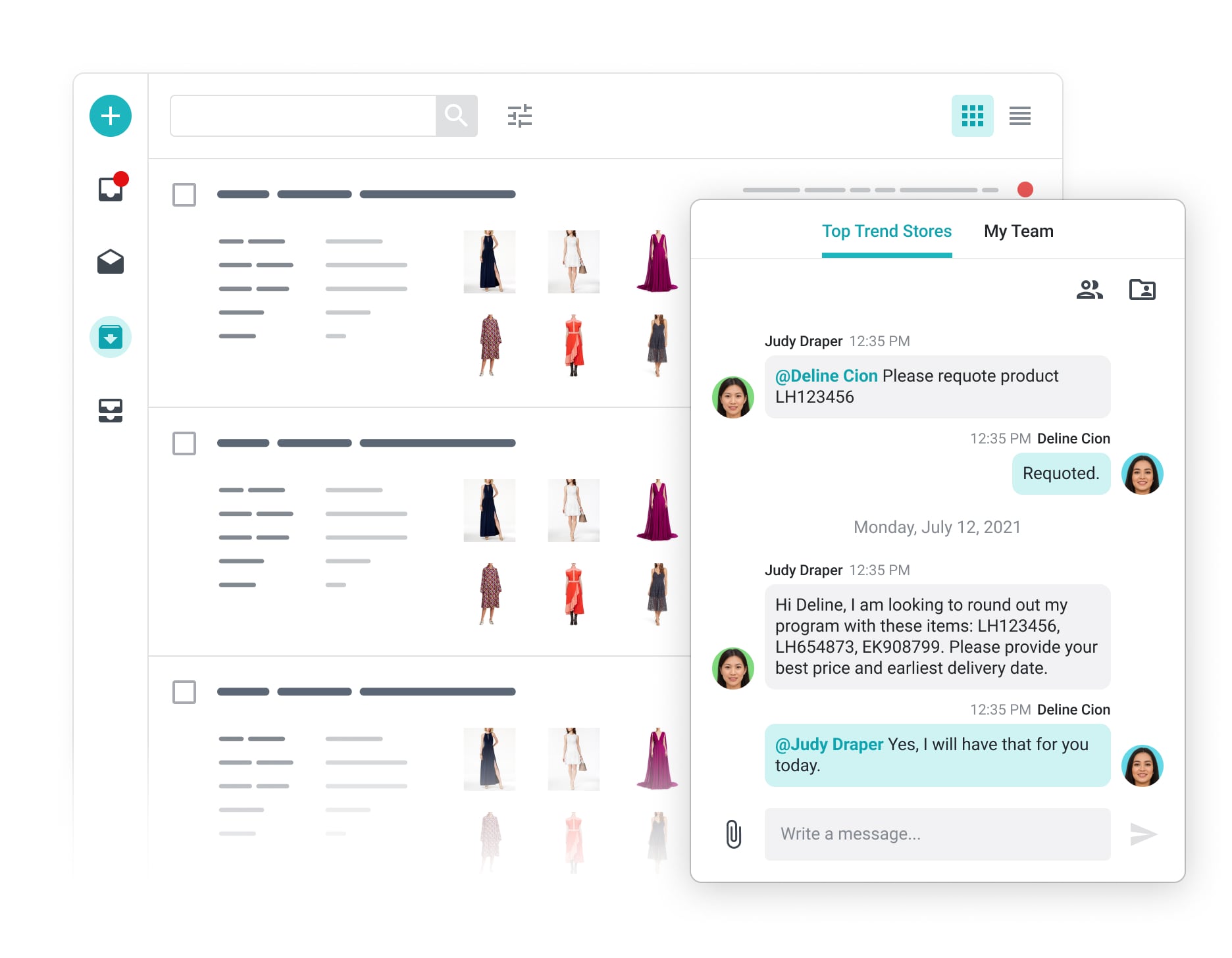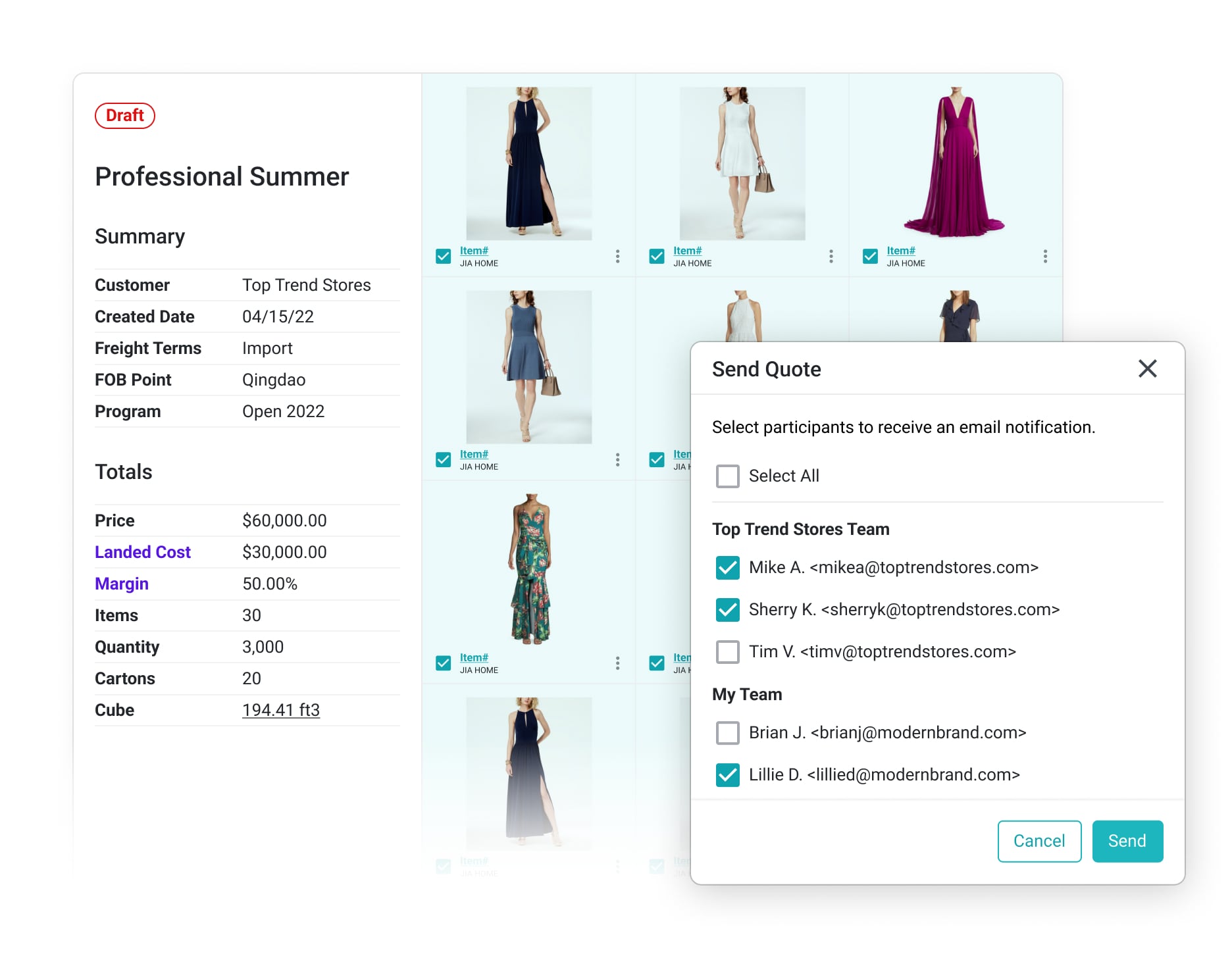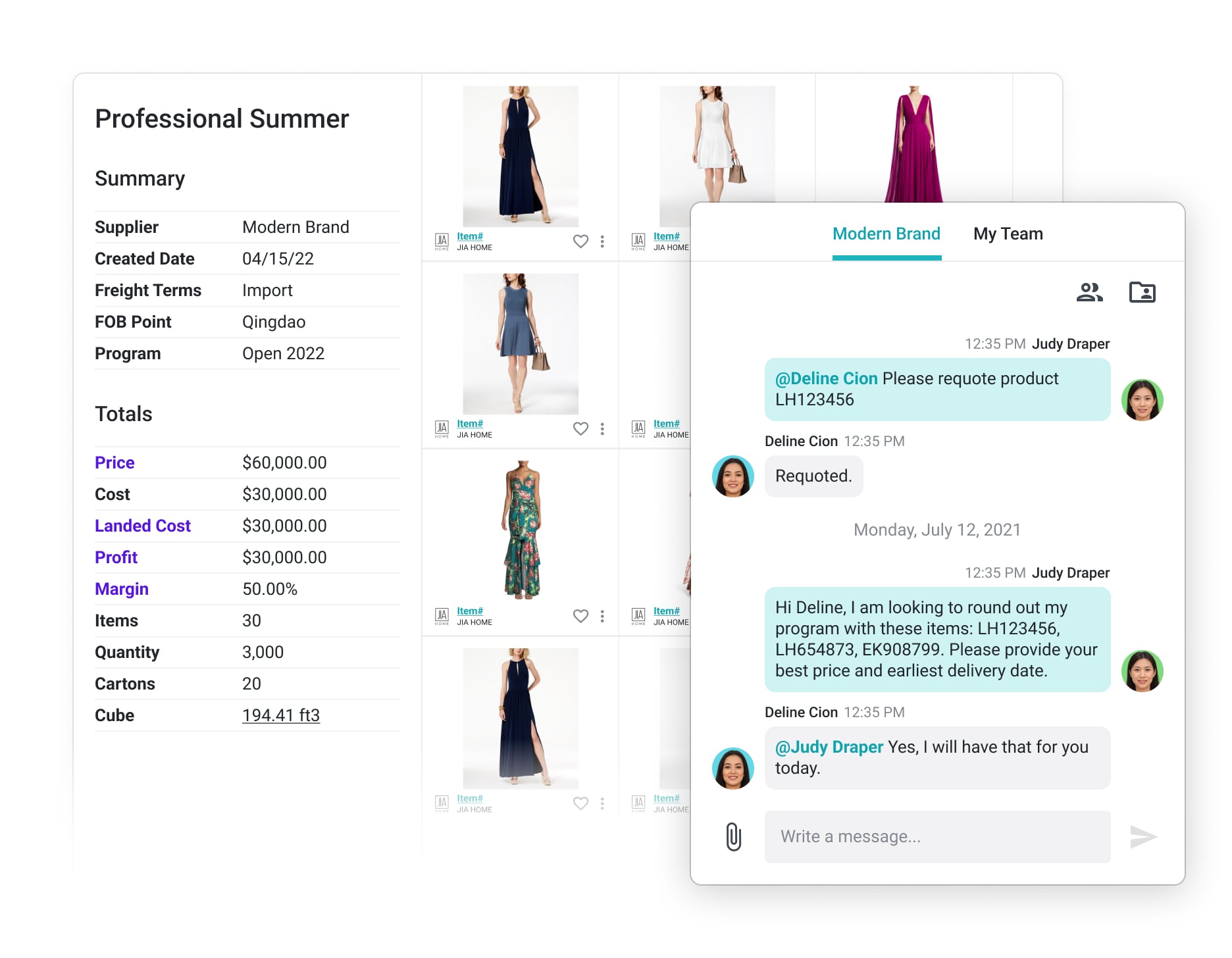Configure Price Quote (CPQ)
Generate all of the contextual data in a fraction of the time
Confirm quotesheets in seconds, so the sales team has time to make bigger money moves.
How long does it take to confirm quotes with your existing RFQ software? Days? Weeks? Months? Quote management processes that used to take weeks takes just hours with Surefront.
With the Surefront RFQ solution, send customizable requests for quotes, manage linesheets, make bids, request payments, agree on pricing, and lock down purchase orders in seconds.
Create quotes up to 10× faster.
All in one place
Imagine having all buyers, quotes, products, historical orders – everything – all in a single system.
Communicate and collaborate with everyone on the team, including internal and external players.

Save 75% of buyers’ time on purchase tasks now freed up for high-value work.
Send multiple quotes with one click
Present your products the way buyers want to see them: in customized formats that you control.
Allow multiple quotes to be sent with just one click, so you can get more quotes to more retailers in record time.

Deliver up to 10× ROI, thanks to unified quote generation, collaborative product data, and streamlined workflows across PIM, CRM, and PLM.
Interact and negotiate directly within the quote
Surefront uses a patented method of contextual communications: each piece of communication is tied to specific data points like products or quotes.
This brings the internal team and retail partners closer to the product information they need.
Create a uniquely immersive collaborative experience, without the hassle of cross-referencing emails and other chat tools. Discover more.

See how you can build quotes 10× faster.


FAQs
RFQ solutions are also called RFP software, or request for price software. The software exists to help procurement professionals manage business requests and proposals. It also helps retailers and vendors negotiate pricing.
Request for quotation solutions are used in retail to streamline the product procurement and sales process. They automate the management of quotation requests and responses from vendors.
Retailers can create RFQs within the platform. They can do this by specifying the products and service they require, as well as the desired price, quantities they need, and delivery schedules for their organizations.
Once the RFQ is finalized, retailers can use the software to send their requests to selected suppliers. This can be done through the platform's vendor communication channels, which may include: email, electronic messaging, or integrated vendor portals.
Suppliers receive the bids to review the details of customers' unique requirements. The software facilitates communication, feedback and collaboration between retailers' procurement teams and suppliers throughout the bid process.
Request for quotation platforms centralize, then organize vendor responses to bids. They capture and store all quotations received, ensuring transparency and traceability. RFQ solutions often have tools to facilitate negotiation with suppliers based on submitted quotations.
Retailers can use quote software to communicate with suppliers, request clarifications, negotiate prices or terms, and finalize agreements. The tools document every phase of the negotiation process.
After evaluating all the vendors' quotations, retailers can select the most favorable offer based on their unique criteria. Request for quotation solutions often allow retailers to compare and rank multiple vendors' quotations. This ranking takes factors such as pricing, quality, delivery, and even supplier reliability into account.
Once the right supplier is selected and the request for a price quotation is generated, RFQ tools can generate a purchase order based on the bid and the agreed terms. The purchase order can then be sent to the supplier directly from the platform.
Request for quotation software often includes reporting and analytics capabilities. Retailers can generate reports to track spend management and supplier performance, analyze quotation trends, monitor cost savings, or identify opportunities to improve their process.
RFQ tools for retail streamline and automate the sourcing and quotation process. They improve efficiency, accuracy, and collaboration between retailers and vendors.
Request for quotation tools offer several benefits to retail businesses, including:
-
Streamlined procurement
When you automate and centralize the entire RFQ process, from creating RFQs to supplier selection, your organization will be more efficient. RFQ software eliminates manual, time-consuming tasks for procurement professionals, such as: sending individual emails, tracking responses, and managing paper-based documentation.
-
Increased supplier collaboration
Request for quotation solutions facilitate collaboration between retailers and suppliers. They provide a centralized platform for the RFQ process where participants can exchange information, ask questions, and clarify requirements. This improves collaboration, reduces miscommunication, and enhances the overall supplier relationship.
-
Improved supplier selection
RFQ solutions let retailers compare and evaluate multiple supplier quotations based on factors, such as: price, quality, delivery terms, and supplier performance. This empowers retailers to make informed decisions.
-
Cost savings
Request for quotation tools promote competition by inviting multiple suppliers to submit bids. Retailers can compare prices and negotiate favorable terms, leading to cost savings.
-
Enhanced transparency and auditability
RFQ software captures and stores all RFQs, supplier responses, and communication history in a centralized repository. This improves transparency, accountability, and the auditability of the procurement process.
It also helps in complying with regulatory and internal policy requirements.
-
Standardized documentation
RFQ programs have standardized templates and forms for creating RFQs to ensure consistency and accuracy in procurement documentation. This minimizes errors and discrepancies, while enhancing positive collaboration throughout the procurement process.
-
Analysis and reporting
RFQ software often includes reporting and analytics capabilities. Retailers can generate reports, then analyze that information to gain insights into metrics like: supplier performance, quotation trends, cost analysis, etc. This data-driven approach helps with strategic decision-making and process improvement.
-
Integration with existing tools
Request for quotation solutions can integrate with other retail programs, such as ERP or procurement platforms. The result is the elimination of manual data entry, while improving accuracy and consistency across systems.
-
Save time and resources
Request for quotation tools automate manual tasks and reduce paperwork, while eliminating repetitive activities. This frees time and resources for retail staff to refocus on strategic activities, like supplier relationship management, negotiation, and process improvement.
RFQ solutions save time by bringing the benefits of automation to the retail procurement, sourcing, and purchasing process. They help retailers make informed sourcing decisions, achieve better terms/pricing, and enhance their procurement and sourcing processes.
Are you deciding which RFQ software to add to your retail business tech stack? There are several features to consider in making your decision.
The solution should allow you to easily compare vendors, create RFQs, specify product details, flag the lowest prices, quantities, and delivery schedules. It should also provide comprehensive services to manage/track RFQs throughout the bid and sales process.
Seek out request for quotation software that's built to facilitate effective supplier communication. It should provide channels for efficiently sending RFQs, efficiently receiving/managing supplier responses, and facilitating collaboration via messaging platforms or supplier portals.
The software should help your organization maintain a comprehensive database of your suppliers, including contact information, performance history, certifications, etc. This helps streamline the supplier selection process, ensures accurate supplier information, and can help your organization save money and time.
Look for a tool lets you compare and evaluate supplier quotations in an efficient manner. It should enable you to assess factors such as pricing, quality, delivery terms, and criteria to inform your procurement decisions. The software should also facilitate side-by-side comparison of quotations to support informed supplier selection.
Consider software that offers features to facilitate negotiation with suppliers to reduce your procurement spend. This may include the ability to send counter-offers, request clarifications and pricing, track negotiation history, and capture agreed-upon terms.
Look for RFQ platforms that provide analytics and reporting. Use them to generate reports on supplier performance, live bid analysis, cost analysis, quotation trends, and other procurement metrics. Analytical insights help identify opportunities for cost savings, process improvement, and supplier relationship management.
Consider request for quotation software or services that integrate with your existing retail tools, such as ERP (Enterprise Resource Planning) or procurement systems. Integration streamlines data exchange and eliminates manual data entry. So you can waste less time and ensure consistency across systems.
Ensure your vendor or RFQ templates prioritize security and privacy. Look for features such as data encryption, user permissions, and secure communication channels to protect sensitive procurement information.
Look for an intuitive and user-friendly interface that is easy to access, navigate and understand. A well-designed interface boosts user adoption and reduces learning time for your procurement management team.
Look for request for quotation software that offers customization options. Thus enabling you to get bids that align with your specific project, procurement processes and compliance requirements. Ensure the software can scale to meet your business growth and evolving needs.
If you have projects that require flexibility and on-the-go access, consider online RFQ software with mobile accessibility. This gives you the ability to create, manage, and monitor RFQs from anywhere using mobile devices.
Evaluate the level of vendor support and access. This may include, for example, training, technical assistance, and software updates. A responsive, reliable vendor service call can ensure support through the full buying process and smooth implementation of your software tool.
Before you buy, review multiple software options to determine which system is the best fit for your specific needs.
RFQ software optimizes the procurement process, letting you automate manual tasks, improve communication between users, facilitate vendor evaluation, and support negotiation. This streamlining and automation of processes will expedite the procurement cycle, reduce lead times, and enhance overall efficiency.
From Our Blog

Future Proofing MerchOps Workflows for the Next Era of Retail

Brands That Move Markets: Lessons from Retail Leaders
